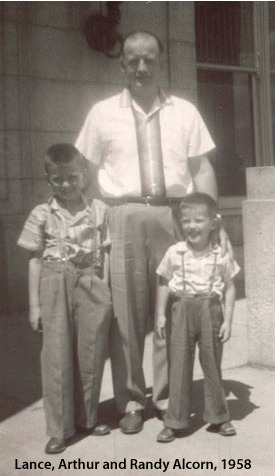Randy Alcorn's Blog, page 210
August 1, 2012
Truth, Grace and My Father's Conversion at age 84
 Listen to the audio of this blog post.
Listen to the audio of this blog post.
My father was the most resistant person to the gospel I’ve ever known. He warned me never to talk to him again about “that religious stuff.”
At age eighty-four, Dad was diagnosed with terminal cancer. One day he phoned, very upset.
“I’ve called...to say good-bye. I’m in terrible pain—I know the end’s coming. I’ve got a gun to my head. I’m sorry to leave you with a mess.”
I begged him to hold on. Jumping into my car, I made the thirty-minute drive in twenty, jumped out of the car, and pounded on the door.
No answer.
Taking a deep breath, I opened the door. On the floor I saw a rifle and a handgun. Calling out for my father, I turned the corner into his room, prepared for the worst. Eyes half-closed, I bumped into him as he walked out. I rushed him to the hospital, where they scheduled him for surgery the next morning.
I arrived an hour before surgery, praying that in his pain and despair, with no easy way out, my dad would turn to Christ. Standing by his bed, I opened my Bible to Romans. I began reading in chapter 3. “‘There is none righteous, no, not one....’ All have sinned and fall short of the glory of God” (vv. 10, 23, NKJV).
Those weren’t easy words to read.
My tavern-owner father had always taken hot offense at being called a sinner. I wanted to gloss over this portion, moving quickly to the good news of God’s grace. But I forced myself to keep reading, verse after verse, about human sin. Why? Because, I told myself, if I really love Dad, I have to tell him the whole truth. If God’s going to do a miracle of conversion here, that’s His job. My job is to say what God says. We made it to Romans 6: “The wages of sin is death, but the gift of God is eternal life in Christ Jesus our Lord” (v. 23). Then Romans 10, about being saved through confessing Jesus as our risen Lord.
Finally I looked Dad in the eyes and asked, “Have you ever confessed your sins and asked Jesus Christ to forgive you?”
“No,” he said in a weak voice. “But... I think it’s about time I did.”
I’ll never forget that moment. The impossible took place right before my eyes: My father prayed aloud, confessed his sins, and placed his faith in Christ, just before they wheeled him into surgery. To me, dividing the Red Sea paled in comparison to this miracle.
The surgery was successful. God gave me five more precious years with my dad. The day I held his hand as he died, I knew I would see not only my mom, but also my dad in heaven.
That morning in the hospital I wanted to minimize the truth of human sin. I wanted to pass truth and go directly to grace. Yet without the bad news, there can be no good news. Without the truth of God’s holiness and the stark reality of our sin, Christ’s grace is meaningless.
The worst thing I could have done to my father was what I was tempted to do—water down the truth. It would have made it easier on me for the moment. But withholding God’s truth from my dad would have been withholding from him God’s grace.

July 30, 2012
Focus on the Family, the Aurora shootings, and Some Courageous Young Men
 Last week I spent two days at Focus on the Family, recording eight radio programs. Six were with Focus president Jim Daly and host John Fuller. I did two interviews each related to my books If God is Good, The Treasure Principle, and Heaven. I loved my time with Jim, John, Royce Bervig and the great folks at Focus on the Family.
Last week I spent two days at Focus on the Family, recording eight radio programs. Six were with Focus president Jim Daly and host John Fuller. I did two interviews each related to my books If God is Good, The Treasure Principle, and Heaven. I loved my time with Jim, John, Royce Bervig and the great folks at Focus on the Family.
I’ve been to Focus in the past but I have never sensed a greater passion for Christ and for serving families than I saw this time. Many people come to Colorado Springs every year to visit Focus on the Family, and I highly recommend doing that. (Check out their Welcome Center.) They have wonderful and fun hands-on facilities for children to play and learn in, as well as one of the finest bookstores I’ve ever seen. I had a blast shopping for my grandsons, stocking up on Adventures in Odyssey (www.whitsend.org) audios, videos and books.
 The two interviews we recorded related to If God is Good center on the problem of evil and suffering. In light of the aftermath of the Aurora murders, Focus on the Family decided to air those programs today and tomorrow, Monday and Tuesday July 30-31. You can listen to the programs online, or find a radio station near you.
The two interviews we recorded related to If God is Good center on the problem of evil and suffering. In light of the aftermath of the Aurora murders, Focus on the Family decided to air those programs today and tomorrow, Monday and Tuesday July 30-31. You can listen to the programs online, or find a radio station near you.
I also did two interviews with Lisa Anderson, program director for young adults at Focus on the Family and host of The Boundless Show podcast. I was looking over their excellent young adult website, www.boundless.org, and read the following article concerning the young men who gave their lives to protect the women they loved. I found it touching, inspiring and insightful:
Real Heroes at 'The Dark Knight' Shootings
by Matt Kaufman
"I pray that in the days to come, we might also catch some small glimmer of God’s redemptive hand at work, as impossible as that may seem in this horrible moment," Adam Holz wrote on this site a few days ago in "Prayer and Mourning After 'The Dark Knight.' "
Well, thankfully, we have now seen just that — and also seen a beautiful illustration of the themes in another recent Boundless post, "Men, Be Protectors."
It comes in the stories of the four young men who gave their lives to protect their girlfriends from alleged shooter James Holmes' murderous rampage. They've given us some of the most powerful examples we'll ever see, both of the broad sacrificial message of Christ and the specific calling of men to be protectors — especially to the women in their lives.
This is Amanda Lindgren remembering Alexander Teves: "I was really, really confused at first about what was going on, so confused. But, it's like Alex didn't even hesitate. Because I sat there for a minute, not knowing what was going on, and he held me down and he covered my head and he said, 'Shh, stay down. It's OK. Shh, just stay down.' So I did."
This is Julia Vojtsek remembering John Larimer: "John immediately and instinctively covered me and brought me to the ground in order to protect me from any danger," Vojtsek wrote in a statement. "Moments later, John knowingly shielded me from a spray of gunshots. It was then I believe John was hit with a bullet that would have very possibly struck me. I feel very strongly that I was saved by John and his ultimate kindness."
Read more of their stories here. Anyone will find them moving, but as a man, these speak to me on a particular, soul-deep level. I hope there isn't a man reading this who can't say the same thing. This, men, is the identity God intends us to have: In a moment of crisis, we protect women at all costs, even our lives. We don't have to think about it. We just do it.
Moments of crisis can also be moments of clarity. Much of our lives are distorted by ideologies like modern feminism, which hold all gender roles to be "sexist" and "oppressive." Men and women alike, even if they don't really believe it, are often intimidated or confused by it. But when the bullets start flying, all that goes out the window. Then all of us know instantly who and what men should be.
Thank you, Alexander Teves, John Larimer, Matthew McQuinn and John Blunk. Your sacrifices have not been in vain. You saved the women in your lives, and you inspired a nation.

From Eternal Perspective MinistriesExplore Randy’s books on the subject of evil and suffering:
If God Is Good
Every one of us is experiencing— or will experience—suffering. In such difficult times, suffering and evil beg questions about God— Why would an all-good and all-powerful God create a world full of evil and suffering? And then, how can there be a God if suffering and evil exist?
90 Days of God’s Goodness
Here are 90 daily reflections dealing with virtually every aspect of the single biggest question that blocks people’s faith in God: If God is good, why is there so much evil and suffering?
The Goodness of God
In this focused condensation of If God Is Good, we’re continually guided into a deeper glimpse of God’s loving ways and higher purposes—the very things we’re often most blinded to whenever we battle pain and anguish.
If God Is Good… Why Do We Hurt? Booklets
This booklet faces our most pressing questions about evil and suffering with sensitivity, skillful insight, and a heart of compassion. Ideal for church giveaways or individual gifting.
July 27, 2012
The Master’s Touch: Paintings by Ron DiCianni

Then the Lord said to Moses, “See, I have chosen Bezalel son of Uri, the son of Hur, of the tribe of Judah, and I have filled him with the Spirit of God, with skill, ability and knowledge in all kinds of crafts—to make artistic designs for work in gold, silver and bronze, to cut and set stones, to work in wood, and to engage in all kinds of craftsmanship.” (Exodus 31:1-5)
I first met artist Ron DiCianni many years ago at the Christian Bookseller’s Convention (now called ICRS). We had a warm chat, and he signed one of his prints and gave it to me. I admired his paintings; he enjoyed reading my books. Eventually Ron Beers from Tyndale House asked me to write a novel inspired by Ron’s powerful painting called Safely Home. It’s the one that’s inside the cover of each copy of the book. The painting Ron sent me still hangs on my office wall.
 Later Ron asked me to write a children’s book on Heaven, called Tell Me About Heaven. It contains eleven of his fantastic paintings, eight of them created specifically for the book. And three of those paintings hang on our walls as well. I gaze at them often. Among them is this one I wrote out my idea for, and Ron painted so magnificently: a grandfather with his grandson, gazing up at the stars. I named the boy Jake (my oldest grandson), and the Springer Spaniel was inspired by our dog Champ. (Just last month I slept outside with four of my grandsons, pointing up at the stars and telling them their names, our dog Maggie with us. It was glorious.)
Later Ron asked me to write a children’s book on Heaven, called Tell Me About Heaven. It contains eleven of his fantastic paintings, eight of them created specifically for the book. And three of those paintings hang on our walls as well. I gaze at them often. Among them is this one I wrote out my idea for, and Ron painted so magnificently: a grandfather with his grandson, gazing up at the stars. I named the boy Jake (my oldest grandson), and the Springer Spaniel was inspired by our dog Champ. (Just last month I slept outside with four of my grandsons, pointing up at the stars and telling them their names, our dog Maggie with us. It was glorious.)
Ron’s desire is to reclaim the arts for the glory of Christ. Earlier this year he completed the stunning Resurrection Mural, which is displayed at the Museum of Biblical Arts in Dallas.
 Another of Ron’s projects is a new painting titled Before I Formed You in the Womb… inspired by Jeremiah 1:5: “Before I formed you in the womb I knew you, and before you were born I consecrated you.” It is a statement that each life, as we’re told in Scripture, is known and crafted by God for a purpose.
Another of Ron’s projects is a new painting titled Before I Formed You in the Womb… inspired by Jeremiah 1:5: “Before I formed you in the womb I knew you, and before you were born I consecrated you.” It is a statement that each life, as we’re told in Scripture, is known and crafted by God for a purpose.
In the artist’s note, Ron explains that he himself is an abortion survivor:
As one who almost never had the chance to become what God had planned for me, I know firsthand the special meaning of what God told Jeremiah.
"Before I formed you in the womb I knew you, before you were born I set you apart..."
My mom had stopped her abortion attempt just as the procedure began, because she heard the voice of God saying to her, "Don’t do this... I have a plan for this baby."
God has a plan for every baby He has formed in the womb. Many have never seen the light of day, or gotten to become what He knew they could. I wonder if, through abortion, we have killed the person who was to have found the cure for cancer? Have we cut short the life that was supposed to become a righteous leader to end needless suffering in the world? Chances are, we have.
This painting is a visual translation of Psalm 139. "For You created my inmost being; You knit me together in my mother’s womb. I praise You for I am fearfully and wonderfully made; Your works are wonderful." If we could reach back into time and allow each child to be born, we would be a better world. Since we can't, I'm hoping we will allow a future that will give each child the opportunity to live. Look at the painting closely and you will see a cross formed by the shadow of Christ's hand. That's the measure of His love for every baby. He died so they wouldn't have to.
—Ron DiCianni
A major portion of each print of Before I Formed You in the Womb… goes to fund pro-life efforts, including the 180 Movie project and pro-life pregnancy centers.
Ron has become a good friend over the years, and I thank God for a brother who uses his gifts well. You can see more of Ron’s beautiful paintings at www.tapestryproductions.com.

July 25, 2012
Office Depot, Lady Gaga, and the Born This Way Foundation
 Our friend Claire Hartford wrote the following letter to Office Depot. Having happily done business with Office Depot for many years, we at EPM wrote a similar letter, and are withdrawing our business unless they choose to stop promoting, and using for their own promotion, one of the worst role models in our country.
Our friend Claire Hartford wrote the following letter to Office Depot. Having happily done business with Office Depot for many years, we at EPM wrote a similar letter, and are withdrawing our business unless they choose to stop promoting, and using for their own promotion, one of the worst role models in our country.
Here’s Claire’s letter:
Dear Office Depot,
I was very disappointed to see that your company has partnered with Lady Gaga and her foundation, Born This Way. Why? First of all, Lady Gaga is a remarkably poor role model for America's youth. Even a cursory check of her lifestyle, fashion choices and song lyrics demonstrate an outrageous coarseness and tastelessness. Why would Office Depot choose to partner with such a polarizing figure, a person who has regularly gone out of her way to offend the moral sensitivities of most Americans? What dolt in the Office Depot advertising department okayed that idea?
Secondly, I went to the “Stories of Bravery” on the foundation website, and discovered (no surprise) that most of the testimonies there involved a defense of homosexual practice. Where are the stories of young soldiers going into harm's way? Or the stories of young students resisting peer pressure in order to do well in school academics or sports? What about the young man or woman who holds a job while also working hard in their studies? What about the young person who chooses not to have sex until they are married or the young mother who stood against the pressures of obtaining an abortion when she discovered she was pregnant? What about the young person who takes his/her summer vacation to help others?
No, these kinds of stories aren’t included in the foundation website. Instead, they are nearly all about gay identity and gay social practice. The agenda of the foundation couldn't be clearer. Born This Way (and apparently Office Depot) interpret bravery in a very limited, very directive way.
Because Office Depot has made such an elaborate campaign to help promote and fund Lady Gaga's career and the Born This Way Foundation, I will be taking my business (which has been substantial over the years) elsewhere.

July 23, 2012
How do you define purity?
God says, “You should be holy, because I the Lord God am holy” (see Leviticus 20:26, 1 Peter 1:16). In other words, holiness is built into the character of God. He has a separateness and hatred toward sin. God does not want to be near sin, and He does not want us to be near it either.
The greatest argument for sexual purity is God’s holiness. If we wish to be godly, we must wish to live in sexual purity.
This doesn’t mean being anti-sex. God has created our sexual identities as a gift. But a sexual relationship is to take place only in that sacred relationship of marriage between one man and one woman. We are sexual beings, whether married or not, but sex is reserved only for the marriage relationship. God is holy in his view of sex in marriage, and expects us to be holy, too.
 We are told in 1 Thessalonians 4 that we are to be holy and abstain from sexual immorality. In fact, we are told that is God’s will. I find it ironic that so often we ask, “Lord, what’s your will? What do you really want me to do?” But in fact there are a number of passages of Scripture where God says, “This is my will.” One thing that God has explicitly said is His will is that we are to be sexually pure.
We are told in 1 Thessalonians 4 that we are to be holy and abstain from sexual immorality. In fact, we are told that is God’s will. I find it ironic that so often we ask, “Lord, what’s your will? What do you really want me to do?” But in fact there are a number of passages of Scripture where God says, “This is my will.” One thing that God has explicitly said is His will is that we are to be sexually pure.
In 1 Corinthians 6:18 we’re told to flee from immorality. We’re not to just wait until we get into a compromising situation and sort of hope for the best and play it by ear. When we see temptation coming—and we should see it coming—we should run and literally move away from it.
I was talking with a good friend about fleeing from sexual immorality. He called me on the phone and said he had been down to the county courthouse, where he walked by a kiosk and saw a magazine that tempted him toward sexual impurity. And he said, “I ran—I sprinted all the way to the other side of the building.” I thought, “This is great!” Even though this verse may not be talking about literal running, there is a time where we should physically run away. In the case of my friend, I think God was honored by his desire to separate himself immediately from temptation.
It’s important to realize that sex is a positive thing, not created by Satan, but intended for good by God. (After He created all things, He said, “Behold it was very good.”) But we also have to recognize that we live in a world that is under sin’s curse, and therefore must be very careful as God’s people to separate ourselves from the behaviors of the world around us where immorality is routine and even celebrated. We need to be sure that not only are we avoiding celebrating it, but also that we are separating ourselves from it to be God’s pure people, holy in His sight.

For those reading by email, go to the blog to see the video in this post.
July 20, 2012
God's Small Creatures
 Incredible photography in this video showing what goes on in the “small” world around us, a world of little creatures God created. "How many are your works, O Lord! In wisdom you made them all; the earth is full of your creatures.” (Psalm 104:24)
Incredible photography in this video showing what goes on in the “small” world around us, a world of little creatures God created. "How many are your works, O Lord! In wisdom you made them all; the earth is full of your creatures.” (Psalm 104:24)

July 18, 2012
Signs that Made Me Laugh
 Laughter is God’s gift, and all the more when we face hard days. Jesus promised “Blessed [the word involves a divine impartation of what causes genuine happiness] are you who weep now, for you will laugh” (Luke 6:21).
Laughter is God’s gift, and all the more when we face hard days. Jesus promised “Blessed [the word involves a divine impartation of what causes genuine happiness] are you who weep now, for you will laugh” (Luke 6:21).
“A joyful heart is good medicine, but a crushed spirit dries up the bones.” Proverbs 17:22
“A glad heart makes a cheerful face, but by sorrow of heart the spirit is crushed.” Proverbs 15:13
These photos of signs give me a glad heart and cheerful face. Hope they do the same for you:

July 16, 2012
The Surprising Trend: a Growing Number of Prolife Young People
 As I point out in my book Why ProLife?, not long ago, young people seemed so immersed in moral relativism and tolerance-driven postmodern culture that it appeared they would eventually become uniformly pro-choice. People used to think the prolife movement would die of old age. But something happened. Now, surprisingly, more young people than their parents oppose abortion.
As I point out in my book Why ProLife?, not long ago, young people seemed so immersed in moral relativism and tolerance-driven postmodern culture that it appeared they would eventually become uniformly pro-choice. People used to think the prolife movement would die of old age. But something happened. Now, surprisingly, more young people than their parents oppose abortion.
A 2003 Gallup survey of teenagers found that 72 percent believed abortion was morally wrong. Only 19 percent believed abortion should be legal in all circumstances, compared to 26 percent of adults. About 32 percent of teens, compared to 17 percent of adults, thought abortion should never be permitted.
This was confirmed by a subsequent national poll, and evidenced by larger numbers of teenagers participating in the national March for Life. (One of my great delights each year is to look at the pictures of the annual March for Life, and see all the young faces in the crowd.) By 2010, Gallup updated their survey with the headline “The New Normal: Americans More Pro-Life” and in 2011 their polling revealed that by a 24 percent margin (61-37) Americans want most or all of abortions to be illegal.
Youth webzines such as The Advocate and youth-activist organizations have reported a sharp rise in teen/young adult opposition to abortion. They have also been very instrumental in informing the general public about the dangers associated with abortion. Contemporary websites such as Abort73 reach out to young women and men, encouraging them to choose life. Many young people are refusing to accept their culture’s defense of abortion.
Check out this well-done six-minute video from Students for Life about the growing number of college-aged prolife activists and leaders:
What an encouraging thing to see young people rising to the occasion to defend the unborn. Here’s a generation of postmoderns—people who supposedly have less of a regard for truth than previous generations—who have a heart for the underprivileged and the needy. And many of them are coming to see that the unborn qualify as an abused people group who need to be protected and defended.
Lord, may a growing number of young people serve You by looking out for and standing up for the weakest and most helpless children You have created. We ask it in Jesus’ name. Amen.

July 13, 2012
Dan Franklin on Failed Experiments in Removing Evil
Before I get to today’s blog, I wanted to thank all of you who have prayed for my daughter Angie Stump and our family over the last month. For those who missed my updates on Facebook and Twitter a couple of weeks ago (we post great quotes and other things daily that aren’t on the blog), the wonderful news is that the pathology report confirmed that she does NOT have cancer. The large mass that the surgeon removed was a nodular tenosynovial giant cell tumor (so rare that her knowledgeable surgeon had to look it up). We are feeling great relief and are thanking God. Of course, He would have been just as faithful and good and sovereign if it had been cancer. But I believe He heard the prayers of His people, and we rejoice in his grace and His kindness to us in Christ (Ephesians 2:7). (Angie would appreciate your continued prayers, as she is experiencing extreme discomfort in her scalp related to some nerves that had to be cut during the surgery. Thanks so much.)
This is a great and insightful article by my son-in-law Dan Franklin, teaching pastor at Life Bible Fellowship in Upland, California. It was posted at his blog, Group Think Rescue.

Failed Experiments in Removing Evil
by Dan Franklin
Almost immediately before he lost his mind, M. Night Shyamalan made a movie called The Village. The story revolved around a cloistered community of people who had experienced such pain as a result of human evil that they had looked to remove themselves from society. The movie was not great, but the theme and the message were great.
Without going into specifics, it became evident that the experiment of seeing if they could remove themselves from evil failed. The reason it failed was that they realized the evil was not somewhere "out there" in the world. The evil was "in here," inside each one of us. In fact, the greatest evil in the movie was manifested through the person who appeared to be the most innocent.
When God flooded the whole world in Genesis, it was not an experiment. God doesn't do experiments because he knows everything. But when we read it, we experience it as if it was an experiment. God sees the intense evil in the world and he chooses to wipe out humanity and preserve only a small, God-fearing family. As we read we might think, "Okay, this is how God is going to remove evil from the world. He will wipe away all the evil people and preserve only the good people." If this is what we think, we are soon disappointed.
After the flood, Noah and his family ushered in a new start for humanity. In the midst of this, God promised never to use a worldwide flood to wipe out humanity again. But look at what he said when he made this promise in Genesis 8:21: "Never again will I curse the ground because of humans, even though every inclination of the human heart is evil from childhood. And never again will I destroy all living creatures, as I have done."
God didn't say, "I will never flood the earth again because I have removed evil by removing all those rotten people. Therefore I will never have a need for another flood." He hadn't removed evil and he knew this. And this reality became unmistakably evident in Genesis 9 when Ham selfishly humiliated and violated his own father. Evil remains. The flood couldn't remove evil because evil is not out there, it is in here.
Ten chapters later, we get a strikingly similar story. Lot and his daughters are removed from the evil city of Sodom. God's angels graciously took them away from the corrupt and evil city. Then, as soon as they are clear of Sodom, Lot's two daughters got their father drunk and seduced him so they could continue the family line.
I remember one of my professors saying, "You can take the people out of Sodom, but you can't take Sodom out of the people."
Throughout Genesis, God shows us these "experiments" with how to remove evil. All of them fail. God demonstrates that the only true way to deal with evil is not to deal with our external circumstances, but to deal with our own evil hearts. And, in anticipation of the Messiah, this is exactly what he promises in Ezekiel 36:25-27:
I will sprinkle clean water on you, and you will be clean; I will cleanse you from all your impurities and from all your idols. I will give you a new heart and put a new spirit in you; I will remove from you your heart of stone and give you a heart of flesh. And I will put my Spirit in you and move you to follow my decrees and be careful to keep my laws.

July 11, 2012
Seeking to Reveal the Unseen
 Earlier this year, I did an interview about my job as a writer with Clash, a website for Christian teens. The work I do is more than “just a job” to me. My writing is a ministry, because ministry is service, and every aspect of our lives is to be a service that glorifies our Lord: “Whether you eat or drink or whatever you do, do it all for the glory of God” (1 Cor. 10:31).
Earlier this year, I did an interview about my job as a writer with Clash, a website for Christian teens. The work I do is more than “just a job” to me. My writing is a ministry, because ministry is service, and every aspect of our lives is to be a service that glorifies our Lord: “Whether you eat or drink or whatever you do, do it all for the glory of God” (1 Cor. 10:31).
Name, Age, and State: Randy Alcorn, 58, Oregon
Job-title: Author & Director of Eternal Perspective Ministries
Web/blog site URL: www.epm.org www.facebook.com/randyalcorn www.twitter.com/randyalcorn
Give us your job description in 25 words or less. To help people see the unseen, in my writing and speaking. That God would use me as his instrument, with purity and passion, to represent accurately His truth and His greatness.
To elaborate, it's to probe beneath the surface into the deep longings of people, then to open a door into the invisible spiritual realm so people can see ultimate realities (including God, angels, demons, Heaven and Hell) with the eyes of faith and imagination. Once you catch a glimpse of the other world, the real world, you are weaned from the illusion that reality is limited to our five senses. You can't help but live differently once you learn to see differently. My life verse is "We look not at the things that are seen but the things that are unseen; for the things that are seen are temporary, but the things that are unseen are eternal." (2 Corinthians 4:18).
Describe a typical workday. I usually work in my office, eight feet behind our house. The days seem crowded with responding to people in emails and phone calls, so I do most of my writing later, after Nanci and I have spent the evening together, and she goes to bed. She’s often in bed by 9:00 and I’m usually up until 2AM, sometimes 3, when friends and co-workers and readers are asleep. So there are no interruptions.
What led you to realize that you wanted to do this type of work? My writing stems from a lifelong love of reading, beginning when I was a child. I devoured comic books, science fiction and fantasy short stories and novels, and Greek mythology. I loved having my imagination stretched. Instead of confusing me about reality, I think it helped me see reality in deeper ways. God used all that to prepare me to hear the gospel as a teenager, and respond to Christ. Ultimately, loving to read helped me understand writing, what works and what doesn’t, what touches the heart and draws people toward Christ.
When I was in Bible college, one of my favorite professors jotted a note on a theology paper I’d written. He said, “You should consider being a writer.” I never forgot that comment, and it has often made me think about the power of our brief words of encouragement.
Did you have any heroes or mentors in your industry that you admired? C. S. Lewis, A.W. Tozer and Francis Schaeffer were spiritual mentors to me. Tozer didn’t just speak the truth; he spoke it in penetrating ways. He was an editor and a wordsmith. Lewis showed me how the same mind could produce piercing nonfiction and imaginative fiction.
What type of education or training was required to land your job? I received a bachelor of theology and M.A. in Biblical studies from Multnomah University, and also studied at Western Seminary. I’ve taught part-time at both schools.
What do you love most about your job? I love reading, researching, analyzing and using my imagination. I have labored at improving my writing skills. I ask God for ideas and help, and I often sense Him answering those prayers in the middle of the night when I feel like I’m getting nowhere. Then the breakthrough comes. It’s the Lord.
Whether we build or draw or fix things or make a home for our families, God wants us to yield our gifts to Him, and depend on Him for the next step, even the next breath. I don't always succeed, but that's what I seek to do in my writing. And while writing is sometimes very hard work, I love it.
What one part of your job do you wish you could hire someone else to do? Keep my office organized, handle office details, take care of most of my email. I have two assistants who do a great job but since we work out of separate offices I often do extra things related to my home office. Other staff of Eternal Perspective Ministries help me in innumerable ways, including extracting portions I’ve written in books, articles and emails, and placing them on my Facebook page and Twitter.
What advice would you give to teenagers wanting to get into your field of work? Our worldviews permeate our writing, and if all we soak in is popular culture, a few hours a week at church won’t be sufficient to give us depth and durability. We need to read great books by great Christian thinkers. Become an avid reader of the Bible and good books (all kinds of books, fiction and nonfiction). Take writing classes, attend writing conferences, write smaller projects and try to get something published such as a magazine article.
Don’t buy the myth that writing is easy. It’s not. Some people act like it’s not a real job. A physician might say, “When I retire I’m going to become a writer.” Well, if he’s not writing now, when he retires may be too late to become a good writer. I mean, what if I said, “When I retire from writing I’ll become a physician”? It takes decades and decades to become the best doctor you can be and multiple decades of writing to become the best writer you can be.
Books that were easy to write are usually hard to read. Some writers seem so natural, so effortless. Don’t be fooled. It takes a lot of effort to appear effortless. With everything else competing for your readers’ attention, you must work to earn it. Many people say they want to write a book, but what they really want is to have written a book. Big difference!
Never compromise on research. It’s the reservoir from which you draw your book, whether nonfiction or fiction. Make sure the reservoir is full!
Always give readers a compelling reason to keep turning the pages. They have a thousand alternatives—why should they read your book? Give them uncertainty and create anticipation. “What’s next?” keeps them turning the pages, but predictability is fatal. Figure out the parts readers will skip over; then cut them out.
How does your job allow you to use your God-given gifts? It affords me the time and opportunity to research, to close out the world and look at God’s Word and consider the most effective lines of reasoning or storytelling.
Do you have any hobbies or off-hours pursuits that teenagers would find of interest? I enjoy playing tennis, often with players from the guys’ team at our local public high school, where I used to help coach. When we have opportunities to be in warm water I love to snorkel. And we have friends with a ranch in Texas where Nanci and I really enjoy four wheeling.







